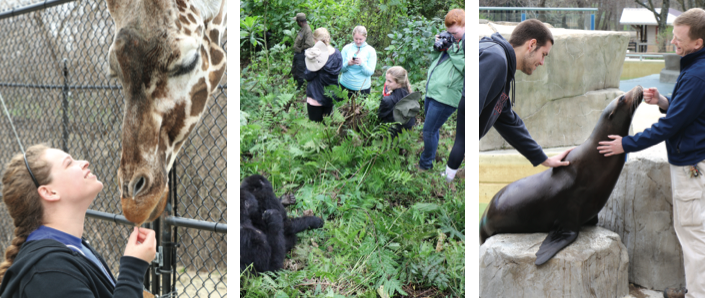Zoo & Conservation Science
Zoo & Conservation Science

Gain real-world experience in zoo and conservation settings, conduct independent research, and prepare to enter a growing career field.
Opportunity knocks
This interdisciplinary major prepares students for leadership roles in zoos and conservation organizations. Hands-on experiences are a key component of this major, which includes a sophomore practicum and a junior-year internship that provide students with direct experience in behavioral husbandry methods central to contemporary zoo management. Drake students join ongoing projects at the Blank Park Zoo and the Ape Cognition and Conservation Initiative, and the optional J-term course in Rwanda allows students to study national conservation planning and observe African wildlife up close and in person.
Ready to lead
Drake’s zoo and conservation science major provides our graduates the background and practical experience needed to enter the field of conservation and zoo science, and advance to coveted area director, curatorial, and management positions. In addition, applicants with strong academic backgrounds and operational animal experience are very marketable as candidates for many senior roles in zoos—including education, operations, member relations, and CEO positions.
Zoos contribute more than $22.5 billion to the economy, support 198,000 jobs, and provide training to more than 5.5 million students annually.
Program Objectives
- Effectively contribute to the contemporary role of zoos in ex situ and in situ conservation efforts and in environmental education
- Describe the role of, and successfully apply the principles of, animal behavior research in captive animal management
- Describe the rationale, function, and limitations of species survival plans and studbooks for limited captive populations in zoo setting
- Understand the accreditation process for zoos and aquaria in the U.S. and effectively participate in accreditation-related continuous improvement
- Apply basic principles of husbandry and management of captive animals
- Describe the rationale and assessment of environmental enrichment as a management technique in zoos; design and implement environmental enrichment techniques
- Describe and apply the principles of collaboration among zoo professionals, including administrative, animal care, veterinary, and research personnel
- Work with veterinary staff within the special conditions that apply to care of captive exotic animals, especially endangered species
- Correctly manage and coordinate behavioral and husbandry data collected in zoo settings
- Understand the dynamics of small populations and apply these principles to maintain genetic diversity and proper demography in the management of captive animals
- Design and execute research projects in captive animal populations, addressing a scientific question or practical problem in a zoo setting
Learn more:
Looking for your admission counselor? Visit the Admission office to find a counselor or schedule a campus visit. For all other questions about the Zoo & Conservation Science Major at Drake University, please reach out to the contact below.
Zoo & Conservation Science Website | College of Arts & Sciences
Michael J. Renner
Professor of Biology & Psychology
515-271-2501
michael.renner@drake.edu
[back]


